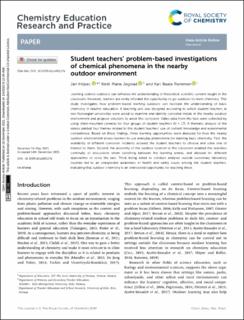Student teachers’ problem-based investigations of chemical phenomena in the nearby outdoor environment
Peer reviewed, Journal article
Published version
Permanent lenke
https://hdl.handle.net/11250/2838780Utgivelsesdato
2021-12-15Metadata
Vis full innførselSamlinger
Originalversjon
https://doi.org/10.1039/D1RP00127BSammendrag
Learning science outdoors can enhance the understanding of theoretical scientific content taught in the classroom. However, learners are rarely afforded the opportunity to go outdoors to learn chemistry. This study investigates how problem-based learning outdoors can facilitate the understanding of basic chemistry in teacher education. A teaching unit was designed according to which student teachers at two Norwegian universities were asked to examine and identify corroded metals in the nearby outdoor environment and propose solutions to avoid this corrosion. Video data from this task were collected by using chest-mounted cameras for four groups of student teachers (N = 17). A thematic analysis of the videos yielded four themes related to the student teachers’ use of content knowledge and experimental competence. Based on these findings, three learning opportunities were deduced for how the nearby outdoor environment allows learners to use everyday phenomena for learning basic chemistry. First, the availability of different corrosion incidents allowed the student teachers to choose and solve one of interest to them. Second, the proximity of the outdoor location to the classroom enabled the seamless continuity of discussions when switching between the learning arenas, and allowed for different approaches to solve the task. Third, being asked to conduct analyses outside customary laboratory routines led to an unexpected awareness of health and safety issues among the student teachers, indicating that outdoor chemistry is an overlooked opportunity for teaching these.

